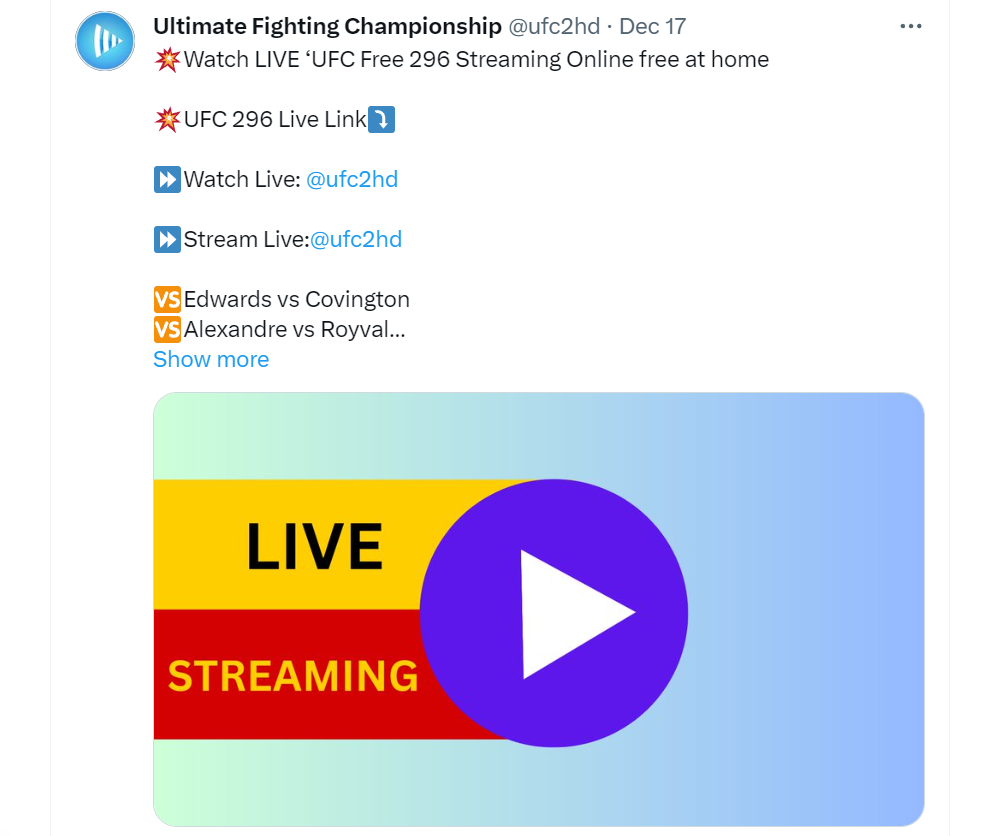The Ultimate Fighting Championship (UFC) is unable to get a tight grip on live streaming piracy. The company sends out thousands of takedown notices to protect its live broadcasts but nearly a quarter of these remain unaddressed after an hour. UFC calls on online service providers to step up their game, which includes 'instantaneous' takedowns and putting a stop to repeat infringers.
The UFC has promoted mixed martial arts fights for three decades. Today, however, the company is also fighting a battle of its own against online piracy.
Unauthorized views of UFC events have taken off in recent years. The organization is trying to put a stop to these pirated livestreams, but that’s proving to be a drawn-out battle.
Last week, General Counsel Riché McKnight shared UFC’s concerns with lawmakers during a House Judiciary Subcommittee hearing. While site-blocking discussions dominated the hearing, UFC’s comments are worth highlighting separately.
“Watch UFC Free”
McKnight’s testimony describes the piracy problem as widespread and costly. Pirated livestreams can get millions of views and these free alternatives result in lower subscriptions revenues.
The problem isn’t limited to people who record or stream UFC events on their phones. It regularly involves organized crime groups that tap into source signals and rebroadcasts them to profit from the advertising views they generate.

These people also brazenly advertise on social media platforms to attract viewers to their pirate websites, with slogans on social media sites such as “Watch UFC Free,” McKnight notes.
“[T]hey will then post those livestreams and recorded videos to those sites, and those videos will often collect hundreds of thousands or millions of views before they are taken down.”
“Expeditious”
According to UFC, several legislative hurdles prevent the company from being more efficient on the takedown front. They include the relatively ‘slow’ response time to DMCA takedown notices.
Under U.S. copyright law, online services are required to “expeditiously” respond to takedown notices if they want to keep their safe harbor protections. However, the law doesn’t define what the term expeditious entails.
“[Online services] often will claim to us that they are removing content expeditiously even when they allow a livestream to stay up for the entirety of a UFC event or remove recorded content days later,” Knight explains.
It can sometimes take hours or days before online services take action. This is a problem, since the value of UFC recordings and live streams diminishes quickly after the event is over.
The UFC calculated that for each event, it sends an average of 1,173 takedown requests for pirated livestreams and an additional 2,246 takedown requests for recorded content. 26% of the pirated livestreams remained online an hour after the takedown was sent. For recorded UFC content, 74% was still up after an hour.
Instant Takedowns
UFC suggests updating the legislative language to clarify the term “expeditious” as that leaves a lot of room for interpretation.
“This issue can be easily remedied by adding a statutory definition to clarify what ‘expeditiously’ means for the purposes of determining whether OSPs are eligible for a safe harbor from liability based on the infringing conduct of their users.
“Specifically, we believe the law should be clear that, for live events specifically, ‘expeditiously’ means ‘instantaneously’ or ‘near instantaneously’,” McKnight adds.

Replacing it with ‘near instantaneously’ still doesn’t set a specific time limit, of course. But it does suggest that taking more than a day to process a livestreaming takedown notice is too long.
Repeat Infringers
UFC’s General Counsel points out that more clarifications are welcome. The DMCA currently requires online services to terminate accounts of “repeat infringers” in “appropriate circumstances”. Neither of these terms are specified.
McKnight doesn’t offer a concrete definition but stresses that online services can take stricter actions against people who repeatedly post infringing content. That includes those who register new accounts.
“This could involve more stringent account verification measures, which some OSPs have already successfully implemented to reduce the prevalence of spam accounts,” he notes.
“Future legislation could make clear that it is not enough to simply terminate a specific account and then turn a blind eye when the same user creates one or more additional accounts.”
Site Blocking
The aforementioned suggestions all rely on the assumption that online services are complying with U.S. law, but that’s not a given. The most notorious streaming platforms are designed to ignore copyright concerns.
For that group, site blocking would be a solution. UFC supports the calls from other rightsholders who believe that U.S. law should be updated to allow courts to issue “no fault” injunctions. These would make it possible to compel ISPs to block pirate sites, without making them liable.
“Under this sort of ‘site-blocking’ framework, copyright owners like UFC could address the harm caused by these websites—enabling U.S.-based users to easily view pirated content—without the existing hurdles to effective enforcement actions against such sites,” McKnight concludes.
These suggestions are all noted by the House Judiciary Subcommittee on Courts, Intellectual Property, and the Internet. Combined with input from other stakeholders, it will then decide whether legislative changes are needed.
—
A copy of the full written testimony from UFC General Counsel Riché McKnight is available here (pdf)



3175x175(CURRENT).thumb.jpg.b05acc060982b36f5891ba728e6d953c.jpg)
Recommended Comments
There are no comments to display.
Join the conversation
You can post now and register later. If you have an account, sign in now to post with your account.
Note: Your post will require moderator approval before it will be visible.